The problem with regular bikes is that they are not convenient to bring to a bus, train, or other public transport systems. Folding bikes, in contrast, don’t suffer such concerns. But are folding bikes worth it?
Folding bikes collapse easily for convenient storage and transportation, making them worth it for urban commuters and those who don’t have enough bike storage or parking space at home or the workplace.
As you’ll discover in this post, these bikes are not for everyone. For example, they aren’t a good choice for off-road users, long-distance cyclists, and big and tall riders.
We’ll talk more about the suitability and unsuitability of these bikes. We’ll also compare them with regular bikes (non-foldable options) to help you choose between them.
Moreover, we’ll talk about the types of foldable bikes and discover a few recommendations.
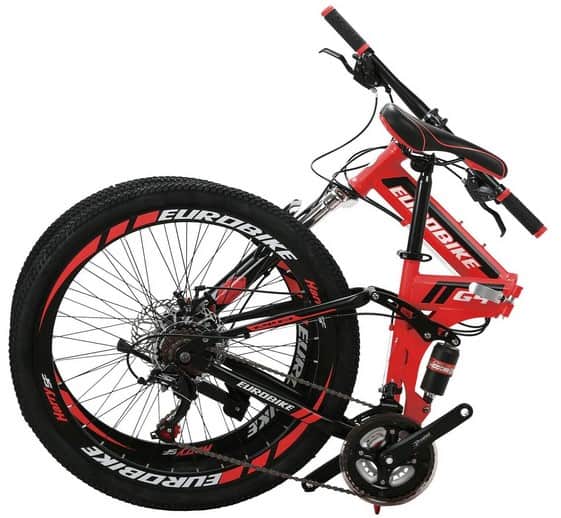
In a hurry? Check out our most recommended foldable bikes below!
5 Best Folding Bikes Worth Your Money.
- Schwinn Loop Folding Bike: Best for Carrying Luggage
- EuroMini EuroMini Urbano: Best for Urban Commuting
- EuroMini Zizzo Campo: Best for Multi-Terrain Commuting
- Eurobike Folding Mountain Bike: Best for Off-Road
- Exerpeutic Folding Exercise Bike: Best for Exercising
Are Folding Bikes Worth It?
Essentially, folding bikes are worth it if:
- You work or stay within or around the city
- You work or stay far away from the bus terminal or train station, and walking is not an option
- Your goal is to cut on transport cost when commuting to work
- You plan to cycle to and from work
- You don’t have enough storage or parking space at home or the workplace
The above pointers lead to one conclusion: folding bikes are best for commuting on urban roads, especially over a short distance.
Of course, the exception is the foldable mountain bike that we’ll talk about later and the exercise bike, which is only for indoor use.
Now, here are the things that make folding bikes worth it for commuting purposes:
a) Easy to Transport
Foldable bikes are not just best for commuting with trains and buses. You can also fold the cycles and put them in your car to save on fuel costs when you get to a place where you can cycle.
Once you get to a safe parking spot, you can leave your car there and take out your bike and ride for the rest of the journey.
b) Mostly Lightweight
Foldable bikes come in lightweight frames to encourage ease of folding. That also facilitates ease of carrying and moving the bike around.
While most regular adult bikes weigh 30-40 pounds, folding bicycles average 24-30 pounds, thus lighter.
c) Can Carry Luggage
Most folding bicycles come with carriers to allow you to carry a few of your things.
The Schwinn Loop Adult Folding Bike, for example, comes with a rear carrier rack for your luggage and a carry bag for personal items.
As a result, it allows you to bring your luggage on short tours.
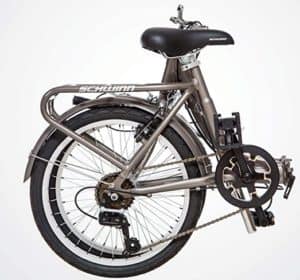
d) Safe to Store
One major issue with regular bikes is that you are often forced to secure them outdoors with locks and sometimes unlocked.
While a lock is safe, it’s not theft-proof as clever thieves can find a way around it.
How about you take your bike indoors?
That’s possible with folding bikes. You can fold them and take them to your office or apartment, thus safe.
e) Highly Maneuverable
Foldable bikes are easy to move about in high-traffic areas. You need to fold the bike and carry it until you get to a place you can ride freely.
That’s unlike regular bikes, which are often bulky to carry or move about in high-traffic spots.
f) Allow You to Be Spontaneous
With a folding bicycle, you can pack and go without having to think twice.
You are always ready for a cycling adventure on short notice as you don’t have to think about strapping and packing your bike.
A bike like the EuroMini Zizzo Campo folds in seconds to allow you to be as spontaneous as you want.
You’ll never have to worry about parking and carrying the bike.
When Are Folding Bikes Not Worth it?
You probably are asking, ‘are folding bikes good for commuting off-road?’ Or perhaps you are not sure if the bike suits you if you are overweight or tall.
Let’s clear the concerns.
Essentially, folding bikes are not worth it if:
- If you intend to ride off-road
Unlike non-folding bikes, foldable bikes offer you a bumpier ride. Primarily, that’s due to their small wheels, which cannot ride over bumps as effectively as larger wheels.
That means folding bikes are not best for off-road cycling but only for on-road cycling.
Another reason why foldable bikes are not best for off-road cycling is that they don’t have suspension.
Manufacturers use the word rigid suspension to describe them, which means they lack a suspension.
As a result, they don’t absorb bumps, making them only suitable for flat paved roads.
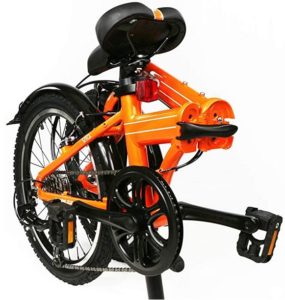
- If you plan to ride long distance
Foldable bikes are not best for long-distance. That’s also due to their small wheels, which don’t cover much ground.
Also, they come with a smaller gear range, which only makes them more suitable for short rides.
- If you are overweight or tall or both
Sadly, foldable bikes cannot hold massive weight, especially over 300 pounds. They also come in smaller frames, making them unsuitable for taller guys.
So, if you are overweight and tall, you have to look for regular bikes for overweight and tall guys.
Folding Bikes Vs. Regular Bikes (Non-Foldable Bikes)
To help you understand the difference between folding bikes and non-folding options, here is a table summary.
| Folding Bike | Regular Bike | |
| Weight | Often lightweight | Heavier than foldable bikes |
| Speed | Not as fast as regular bikes | Usually, the speedier option |
| Portability | Easy to carry, and you don’t need a rack | Often too bulky to carry, and you most likely need a bike rack |
| Public Transportation | Unrestricted on public transport systems | Often too bulky to bring to a bus or train unless upon prior request |
| Security | Easy to take indoors for safekeeping | Mostly locked or chained outdoors, thus not very safe |
| Maneuverability | Easy to maneuver in high-traffic places | Not as maneuverable as folding options |
| Off-Road Use | Not best for off-road (apart from folding MTBs) | Most options are best for all-terrains |
| Long-Distance Use | Not best for long-distance cycling | Best for long-distance cycling |
| Suspension | Lack suspension | Most have suspension |
| Price | Slightly costlier | Not as costly as folding options |
Different Types of Foldable Bikes
Foldable bicycles come in different types that include these three:
- Commuter bikes/city bikes
- Mountain bikes
- Exercise bikes
1. Foldable Commuter Bikes
Folding commuter bikes are what the name suggests. They are designed for commuters but not just any commuter.
They are best for urban commuters. As a result, these bikes are popularly known as folding city bikes.
They come in simple geometry, smaller wheels, and a smaller gear range of about 7-8 speeds.
Three of the best folding commuter or city bikes are:
a) Schwinn Loop Adult Folding Bike – Best for Carrying Luggage
The Schwinn Loop Adult Folding Bike simplifies your urban commuting experience.
For starters, it comes with a 7-speed drivetrain that allows you to ride on city roads smoothly. On its rear end is a carrier for your luggage and a detachable bag for stashing a few essentials.
Its 20-inch wheels roll seamlessly on paved roads, and it enjoys dual linear-pull brakes for safe stopping.
Overall, this bike suit commuters who are 4’7”-6’2”.
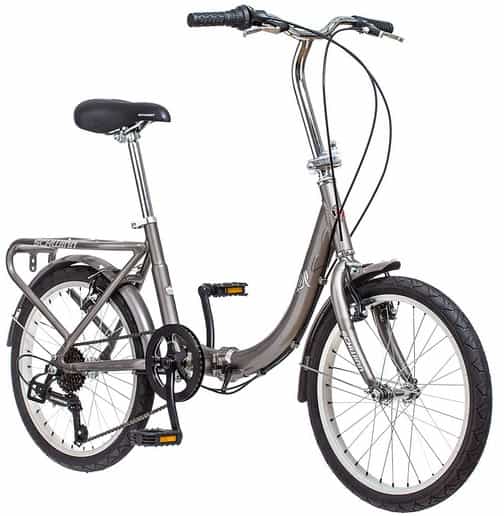
b) EuroMini Folding-Bicycles EuroMini Urbano – Best for Urban Commuting
The EuroMini Folding-Bicycles EuroMini Urbano has everything you expect from a day-to-day urban commuter cycle. The bike folds in seconds for easy transportation on a bus or train.
Thanks to its v-style linear-pull brakes, it has crisp stopping potential.
This bike only weighs 24.5 pounds, thus super-lightweight. But despite its extra lightweight, this bike can bear up to 240 pounds. That’s owing to its double-wall rims.
It also has high-strength resin pedals, an 8-speed shifting system, multi-terrain tires, and a magnet catcher for its transportation.
c) EuroMini Zizzo Campo 2019 – Best for Multi-Terrain Commuting
If you want to commute light and fast, the EuroMini Zizzo Campo 2019 (View on Amazon) is a safe bet.
It folds in seconds, thanks to its space-saving aluminum frame. Impressively, its 2-inch multi-surface tires allow you to also ride on not-so-rough off-road.
Shifting on urban roads is seamless with this bike due to its 7-speed Shimano drivetrain and grip-style shifters.
Its v-style cantilever brakes, on the other hand, promote easy and safe stopping, while its magnet catcher enables you to fold it securely.
2. Foldable Mountain Bikes
While folding bikes are generally best for urban cycling, the exemption is a foldable mountain bike.
Folding mountain bikes are very rare but very practical off-road. You can expect them to come with a wider gear range than commuter options.
They are also tough-built and rugged to tolerate the unforgiving outdoors. What’s more, they come with powerful brakes for crisp stopping in challenging conditions.
One fantastic choice is the Eurobike Mountain Bike Folding Bicycle.
Its outstanding features include a 21-speed shifting system, dual disc brakes, steel frame, iron-racing handlebar, steel suspension fork, and double-alloy rims.
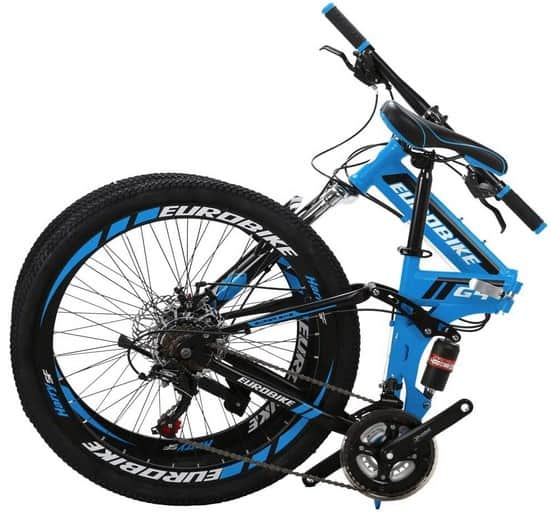
3. Foldable Exercise Bikes
Foldable bikes are not just about outdoor cycling. No! We also have indoor options.
So, don’t worry if outdoor foldable bikes are not best for exercising, as you can still get an indoor foldable bike for your workout.
One such bike is the Exerpeutic Folding Magnetic Upright Exercise Bike.
This indoor bike comes equipped with a pulse sensor to track your pulse and monitor it and other stats on its LCD.
The foldable bike can hold up to 300 pounds, thus perfect for plus-size guys. It also suits taller guys, given that its height is adjustable to match users who are 5’3”-6’1” tall.
It has 8-resistance levels to allow you to do both easy and challenging workouts.
Overall, its space-saving, foldable design makes it ideal for tighter workout spaces.
FAQs
1. Is It Worth Getting A Folding Bike?
If you are an urban commuter who would love to save on transportation costs, a folding bike is worth it.
The bike is also worth it if you don’t have enough parking or storage space or prefers to keep your bicycle indoors.
2. Are Folding Bikes Any Good?
Folding bikes are an excellent choice for urban commuters who would love to bring their bikes to a bus or train.
They fold easily for convenient storage and transportation, especially when you don’t have enough storage or parking space.
3. Are Folding Bikes Good For Long Rides?
Folding bikes are not generally ideal for long-distance cycling unless they come with a wide gear range.
Even so, they don’t suit surfaces that are rocky, hilly, or with potholes.
These bikes are generally best for short rides, more so on city roads.
4. Are Folding Bikes Comfortable To Ride?
Foldable bikes come with smaller wheels that roll seamlessly on urban roads, thus comfortable. Their low-lying geometry makes them easily accessible and comfortable.
The only problem is that their small wheels and lack of suspension mean a bumpier ride off-road.
5. Do Folding Bikes Break Easily?
Folding bikes usually have weight limits that users shouldn’t surpass. If you do, then the chances of the bike frame breaking or the rim bending are higher.
Note, however, that the weight capacity of foldable bikes is not as great as that of regular cycles. They rarely bear more than 300 pounds.
6. Are Folding Bikes Dangerous?
Folding bikes are generally safe to ride if you don’t exceed their carrying capacity. They become dangerous when you overload them.
Like regular bikes, safety is primarily dependent on the rider. If you ride a foldable bike safely, then you won’t have to worry about anything.
7. Are Folding Bikes Good For Exercise?
Folding bikes are only best for short-distance commuting, especially on urban roads. As a result, they are not best for exercise.
If you want to exercise, better get a road bike, cyclocross, mountain bike, or indoor bike.
Are Foldable Bikes Worth It? Our Verdict
Folding bikes are generally worth it for regular urban commuters, especially those who use public systems.
They also suit spontaneous, adventurous cyclists who do not have adequate storage or parking space at their workplaces or where they stay.
Frequently Asked Questions
What are the drawbacks of getting a folding bike?
While a folding bike can be incredibly handy for city living and commuting, there are a few challenges one might encounter. For instance, due to their compact dimensions and smaller wheels, folding bikes may not offer the smoothest ride. This can be of little consequence if your adventures are confined to well-paved city streets or you’re only riding short distances. However, if you’re someone who enjoys vigorous rides on irregular terrains like gravel or off-road trails, a folding bike might not be the best option. Larger, mountain or hybrid-style bikes with bigger wheels and suspension would better cater to such needs. Moreover, the foldable nature of these bikes means that they incorporate numerous hinges and joints, which could potentially wear out faster than a relatively sturdier, traditional bike. However, a well-maintained folding bike can serve you well for years.
Is a folding bike a good investment?
When it comes to ease of commuting, nothing really beats a folding bike. Not only are they remarkably compact, but their foldability feature allows them to be transported with minimal fuss. For instance, you could effortlessly bring them aboard public transportation, thus extending your travel range or bypassing less friendly biking routes. Moreover, their ability to be folded up means your bike is at a lower risk of being stolen, as you can bring it into your office or home. Storing them is a breeze too – once folded up, they require less space than a regular bike. In other words, a folding bike is an excellent choice for those living in apartments or other small spaces.
How durable are folding bikes?
If you invest in a quality folding bike, you can expect it to serve you well over a good number of years. Of course, the longevity of folding bikes, like any other bicycle, greatly depends on their usage, care, and maintenance. However, it’s important to remember that folding bikes, particularly the ones with smaller, smoother tires, are mainly designed for city riding and shorter commutes. Their configuration isn’t usually conducive for long-distance rides or off-road biking, unlike their mountain bike counterparts which feature larger, “knobby” tires for better traction and low rolling resistance. So keep your needs and planned usage in mind when buying a bike.
Why might one choose to buy a folding bike?
Folding bikes come with a string of benefits that make them an attractive buy. Primarily, they are space savers. Whether you live in a small city apartment or struggle with limited storage space, a folding bike fits the bill perfectly. They can also be a companion for your commute, as you can simply fold them up and take them with you whether you’re boarding a train, bus, or cab. This also means that you don’t have to worry about parking or theft, as your bike remains with you at all times. Plus, with the rise in popularity of electric folding bikes, you can actually speed up your commute and lessen your physical exertion – a win-win situation when you’re zipping around the city or running errands!